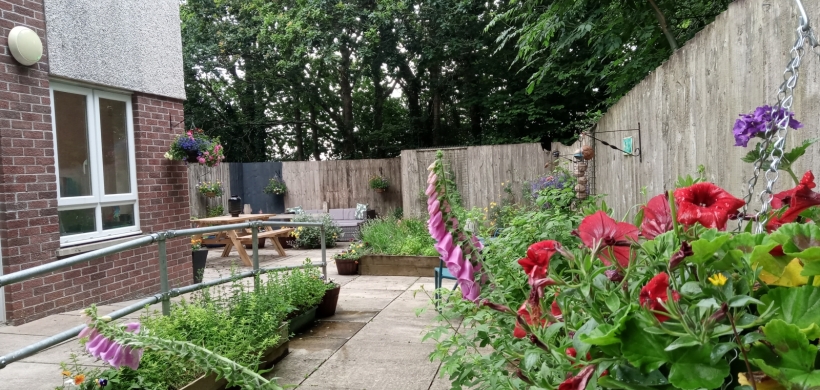At LiveWest, we are Creating Greener Futures Together. We are working with our customers and partners to ensure sustainability lies at the heart of our organisation, shaping healthier futures across our communities.
Every month, we share some of our favourite green advice, to help our customers and colleagues live more sustainably. This month we are sharing advice on how you can make your garden or green space bird-friendly.
The RSPB Big Garden Birdwatch is back this month. Each year the RSPB run Big Garden Birdwatch, calling on members of the public to get their binoculars out and record the birds in their garden. By sharing this information with the RSPB, we can help them to understand the status of birds in the UK.
Now, with the nature and climate emergency, birds need our help more than ever.
With just a little time and effort you can make your garden or green space a place birds love to visit. Turning your garden or green space into a haven for birds will also mean you get to enjoy seeing a wider variety of species visiting throughout the year.
If you have children, getting them involved in making your garden bird-friendly is a great way to introduce them to nature and teach them about caring for the environment.
Here are our top tips to help birds in your community:
Food:
Different species of birds eat different things, so providing a variety of bird foods will mean you see a wider variety of bird species visiting your garden.
If you can, provide birds with a good mix of peanuts, seeds, mealworms and waxworms. Good ready-made mixes should contain sunflower seeds, broken peanuts, flaked maize and smaller seeds, such as millet.
Certain household foods such as pastry, cooked rice, breadcrumbs and fruit are also enjoyed by many garden birds. Avoid anything salted though, such as salted peanuts, as these can poison birds. You should also be careful of feeding birds dried fruits, such as raisins, if you have a dog, as these can be poisonous to your pet.
Make sure to remove old food and clean your feeders weekly, to prevent the spread of diseases.
In the winter, providing food for birds can save their life. In the case of extreme cold weather, you should aim to put food out twice a day, in the morning and in the afternoon.
To prevent pests, store any bird feed securely, and use rodent-proof feeders. Attaching catch trays under your feeders will also prevent pests, as they will stop any food falling onto the ground. Keeping the rest of your garden clean will reduce the chances of pests. You can also remove any remaining bird food at night.
To protect the birds in your garden from predators, such as cats, place your feeding station away from fences and dense hedges where cats can easily get to them. Instead, placing your bird feeding station near a small bush will allow birds to use this as a look-out point to check it is safe to feed.
And don’t forget to make sure your feeding station is visible from a window so you can enjoy watching the birds!
Water:
Birds need clean water for drinking and bathing. Providing water is especially important in winter, when natural supplies may be frozen, and in hot weather, when water may be harder to find.
You can help birds by providing a bird bath, where they can safely drink and bathe. The RSPB provide the following advice for choosing a bird bath:
- It needs to have shallow sloping sides with a shallow approach to water.
- To allow different species to bathe, provide a sloping bath, so the water is between 2.5cm and 10cm (1-4 inches) deep.
- The surface of the bath needs to be rough so birds can grip it with their claws, and not slip.
- It should be sturdy but light enough that it's easy to clean.
It is important to keep your bird bath clean to prevent birds from catching diseases. Scrub the sides and the bottom of your bird bath every few weeks to remove algae and dirt and refill it with clean water.
In the winter, your bird bath may freeze over. You can pour boiling water onto it to melt the ice. Never add any chemicals (such as glycerine, anti-freeze or salt) to the water to prevent it from freezing. This could poison the birds and stop their feathers from being waterproof.
Birds may be more vulnerable to predators when using your bird bath. To protect them, place the bath somewhere where the birds have clear visibility, with bushes or trees nearby to provide cover if alarmed, and perches to use when preening. Ensure cats cannot use the cover of the bushes to attack bathing birds by placing a thick layer of clippings from thorny vegetation, such as rose or pyracantha, beneath the bushes.
Protection from cats and other predators:
If you have a pet, you can protect birds from them by making a few simple changes. If you have a cat, keep them inside as much as possible. If you do let your cat outside, consider adding a bell to their collar to warn birds of their presence and avoid letting them out during the morning when most birds are feeding. If you have a dog, supervise them while they are in your garden. If your pet catches a bird and brings it to you, do not reward them as this will encourage them to do it again.
You can protect birds in your garden from other predators by considering the placement of your bird feeding station and bird bath. Keep these far enough from any windows that if birds need to flee from a predator they won't fly into the glass. Having these elevated off of the ground, away from fences and near prickly shrubs will also make it safer for birds to drink, feed and bathe.
Keeping nest boxes elevated will keep birds and their eggs safe from predators on the ground.
Shelter:
You can encourage birds into your garden by providing plenty of places to nest. A nest box is an excellent substitute for a tree hole. The species you attract will depend on the location, the type of box, and the size of the entrance hole. The RSPB have lots of great information on making and maintaining nest boxes in your garden.
Birds may choose to nest in the eaves of your home or in your shed. If you find birds nesting in your home or garden you must not move, block off or destroy the nest. It is illegal to disturb an active nest. The birds are very unlikely to cause any damage to your home and many are suffering from a shortage of nesting sites, and any lost site can be very difficult to replace.
You should avoid trimming hedges during the spring and summer, as this is nesting season for most birds. Unless you can be absolutely certain that the hedge is not being used by nesting birds, then work of this nature is always best left until the autumn.

You can sign up for the 2024 Big Garden Birdwatch on the RSPB website now. All you need to do to take part is count the birds you see in your garden, from your balcony or in your local park for one hour between 26 and 28 January 2024.
For more information on caring for your garden or green space throughout the year, and for a guide on building your own nest box, visit our Gardening page.
